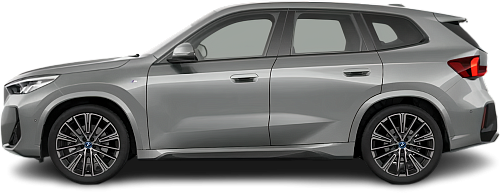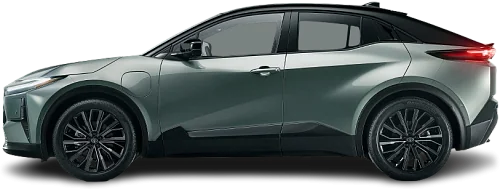USA EV Comparison: BMW iX1 eDrive20 vs Toyota C-HR+ 77 kWh FWD
Struggling to Decide? Let AI Help!
Your AI Summary Is Ready!
General Info
While the BMW iX1 eDrive20 (2023-…) is currently produced, it is not offered for sale in the United States. The Toyota C-HR+ 77 kWh FWD (2025-…) is announced, but not yet in production.
The two vehicles share the same body style: SUV.
| Property | BMW iX1 eDrive20 | Toyota C-HR+ 77 kWh FWD |
|---|---|---|
| Years of Production | 2023-… | 2025-… |
| Current Status | Produced | Announced |
| Country of Manufacture | Germany, India, China | Japan, China |
| Body Style | SUV | SUV |
| Market Availability | EU | EU, USA |
| GCC Score | 6.1 | 6.6 |
Range and Efficiency
The Toyota C-HR+ 77 kWh FWD (2025-…) boasts a greater real-world range, a larger battery, and superior energy efficiency compared to the BMW iX1 eDrive20 (2023-…).
| Property | BMW iX1 eDrive20 | Toyota C-HR+ 77 kWh FWD |
|---|---|---|
| Range (WLTP) | 295 mi | 373 mi |
| Range (GCC) | 245 mi | 317 mi |
| Battery Capacity (Nominal) | 66.5 kWh | 77 kWh |
| Battery Capacity (Usable) | 64.7 kWh | 69.3 kWh |
| Efficiency per 100 mi | 26.4 kWh/100 mi | 21.9 kWh/100 mi |
| Efficiency per kWh | 3.79 mi/kWh | 4.57 mi/kWh |
| Range and Efficiency Score | 7.2 | 9.6 |
Charging
Both vehicles utilize a standard 400-volt architecture.
The Toyota C-HR+ 77 kWh FWD (2025-…) offers faster charging speeds at DC stations, reaching up to 150 kW, while the BMW iX1 eDrive20 (2023-…) maxes out at 128 kW.
Both vehicles are equipped with the same on-board charger, supporting a maximum AC charging power of 11 kW.
| Property | BMW iX1 eDrive20 | Toyota C-HR+ 77 kWh FWD |
|---|---|---|
| Max Charging Power (AC) | 11 kW | 11 kW |
| Max Charging Power (DC) | 128 kW | 150 kW |
| Architecture | 400 V | 400 V |
| Charge Port | CCS Type 2 | Tesla (NACS) |
| Charging Score | 5.8 | 6.4 |
Performance
Both vehicles are front-wheel drive.
The Toyota C-HR+ 77 kWh FWD (2025-…) boasts greater motor power and accelerates faster from 0 to 60 mph.
| Property | BMW iX1 eDrive20 | Toyota C-HR+ 77 kWh FWD |
|---|---|---|
| Drive Type | FWD | FWD |
| Motor Type | PMSM | PMSM |
| Motor Power (kW) | 150 kW | 165 kW |
| Motor Power (hp) | 201 hp | 221 hp |
| Motor Torque | 182 lb-ft | 221 lb-ft |
| 0-60 mph | 8 s | 7.1 s |
| Top Speed | 106 mph | 99 mph |
| Performance Score | 3.4 | 3.6 |
Dimensions
The BMW iX1 eDrive20 (2023-…) and Toyota C-HR+ 77 kWh FWD (2025-…) are about the same size.
The Toyota C-HR+ 77 kWh FWD (2025-…) boasts a more extended wheelbase.
| Property | BMW iX1 eDrive20 | Toyota C-HR+ 77 kWh FWD |
|---|---|---|
| Length | 177.2 in | 178 in |
| Width (with Mirrors) | 82.8 in | - Width (with Mirrors) |
| Width (w/o Mirrors) | 72.6 in | 73.6 in |
| Height | 63.6 in | 62.8 in |
| Wheelbase | 106 in | 108.3 in |
Cargo and Towing
Neither car is equipped with a frunk (front trunk).
The BMW iX1 eDrive20 (2023-…) has a towing capacity of up to 1653 lb, whereas the Toyota C-HR+ 77 kWh FWD (2025-…) is not officially rated for towing in the US.
| Property | BMW iX1 eDrive20 | Toyota C-HR+ 77 kWh FWD |
|---|---|---|
| Number of Seats | 5 | 5 |
| Curb Weight | 4276 lb | - Curb Weight |
| Cargo Volume (Trunk) | 17.3 ft3 | 14.7 ft3 |
| Cargo Volume (Max) | 52.8 ft3 | - Cargo Volume (Max) |
| Cargo Volume (Frunk) | - Cargo Volume (Frunk) | - Cargo Volume (Frunk) |
| Towing Capacity | 1653 lb | - Towing Capacity |
| Cargo and Towing Score | 6.5 | 6.3 |




